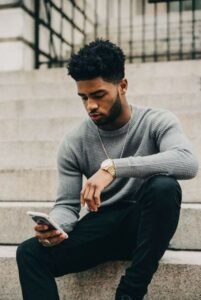Fashion has always been a powerful medium of self-expression, especially for Black men who have navigated complex social landscapes through their sartorial choices. From the Harlem Renaissance to contemporary streetwear, Black men’s fashion has evolved, reflecting cultural pride, resilience, and innovation. This article delves into the rich history, current trends, and future directions of Black men’s fashion, celebrating its profound impact on the broader fashion industry.
Historical Context: black men fashion
The early 20th century marked a significant period for Black men fashion, particularly during the Harlem Renaissance of the 1920s and 1930s. This cultural movement, centered in New York City, saw Black men embracing sharp, elegant styles as a form of resistance and self-assertion. Zoot suits, with their exaggerated proportions, became iconic. These suits, featuring wide-legged pants and long coats, symbolized defiance against racial discrimination and economic hardship.
In the 1960s and 1970s, the Civil Rights Movement and the rise of Black Power further influenced fashion. Dashikis, afros, and African-inspired prints became popular, signifying a reclamation of African heritage and identity. The fashion of this era was not just about aesthetics but also a political statement, highlighting the interconnectedness of style and activism.

The 1980s and 1990s: The Hip-Hop Influence
The 1980s and 1990s witnessed the explosion of hip-hop culture, which had a transformative impact on Black men’s fashion. Hip-hop artists like Run-D.M.C., LL Cool J, and Tupac Shakur popularized streetwear, which combined athletic wear with urban aesthetics. Adidas tracksuits, oversized jeans, and Timberland boots became staples, reflecting a blend of comfort, style, and attitude.
Brands like FUBU (For Us, By Us), founded by Daymond John, Carlton Brown, J. Alexander Martin, and Keith Perrin, emerged, catering specifically to the Black community. FUBU’s success underscored the economic power and cultural influence of Black consumers. The brand’s slogan and ethos resonated deeply, reinforcing the importance of representation and ownership in fashion.
Contemporary Trends: Redefining Black Men Fashion
Today, Black men fashion is incredibly diverse, reflecting a fusion of traditional and contemporary influences. Streetwear remains a dominant force, with brands like Off-White, founded by Virgil Abloh, pushing boundaries and redefining luxury fashion. Abloh’s work, characterized by its blend of high fashion and urban style, has garnered global acclaim, demonstrating the mainstream acceptance and celebration of Black creativity.
Tailoring and bespoke fashion have also seen a resurgence. Designers like Ozwald Boateng and Dapper Dan have brought a modern twist to classic tailoring, incorporating bold colors, intricate patterns, and innovative fabrics. This revival of tailored fashion showcases a sophisticated and elegant side of Black men’s style, appealing to those who appreciate craftsmanship and heritage.
Athleisure, a trend that combines athletic wear with casual, everyday clothing, has gained immense popularity. Brands like Nike and Adidas continue to dominate, but there is also a rise in Black-owned athleisure brands such as Pyer Moss, founded by Kerby Jean-Raymond. Jean-Raymond’s designs often incorporate social and political commentary, making his collections both fashionable and thought-provoking.

The Role of Media and Celebrities
Media and celebrities have played a crucial role in shaping and promoting Black men fashion. Music videos, movies, and social media platforms have provided a stage for showcasing unique styles and influencing trends. Icons like Pharrell Williams, Kanye West, and A$AP Rocky have become fashion trendsetters, known for their eclectic and innovative looks.
Social media influencers and fashion bloggers have also emerged as significant players, democratizing fashion and offering diverse representations of Black men’s style. Platforms like Instagram and TikTok have enabled Black men to share their fashion journeys, inspire others, and challenge traditional fashion norms.
Challenges and Future Directions
Despite the progress, challenges remain in the fashion industry, particularly regarding representation and inclusivity. Black designers and models are still underrepresented in mainstream fashion shows and campaigns. However, initiatives like the Black in Fashion Council and the 15 Percent Pledge, which urges retailers to dedicate 15% of their shelf space to Black-owned businesses, are working towards greater equity and recognition.
The future of Black men fashion lies in continued innovation and inclusivity. Emerging designers are blending cultural heritage with contemporary aesthetics, creating unique and meaningful fashion statements. Sustainability is also becoming a focal point, with many Black designers and brands emphasizing eco-friendly practices and ethical production.
Moreover, technology is set to revolutionize the fashion industry. Virtual fashion shows, digital clothing, and augmented reality (AR) experiences are becoming more prevalent, offering new ways to engage with fashion. Black designers and tech entrepreneurs are at the forefront of these developments, ensuring that the future of fashion is not only innovative but also inclusive and representative of diverse voices.
Conclusion: A Celebration of Style and Identity
Black men fashion is a vibrant tapestry of history, culture, and creativity. From the elegance of the Harlem Renaissance to the boldness of hip-hop and the innovation of contemporary streetwear, Black men have continually shaped and redefined fashion. As we look to the future, it is essential to celebrate and support the voices and talents that drive this dynamic industry.
In embracing the past and pushing the boundaries of the present, Black men’s fashion will continue to inspire and influence, embodying resilience, pride, and an unwavering spirit of innovation. Whether through tailored suits, streetwear, or avant-garde designs, Black men’s fashion remains a powerful expression of identity and a testament to the enduring legacy of Black culture in the world of style.



